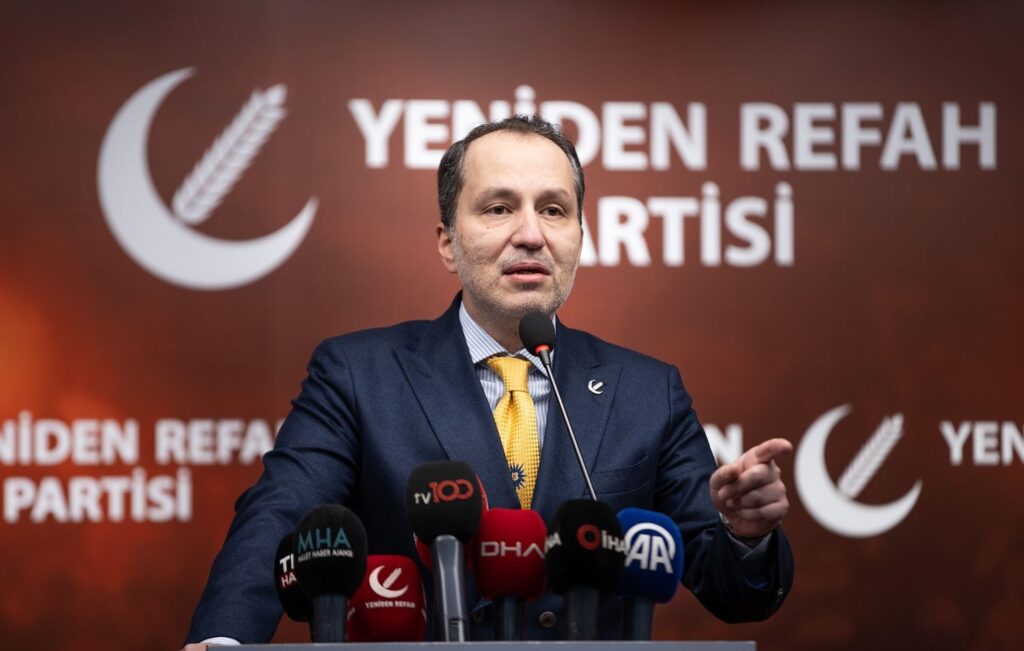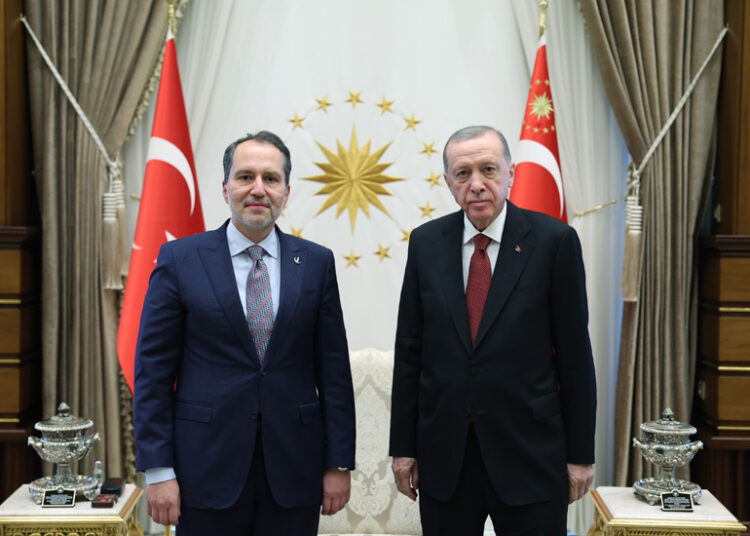Fatih Erbakan, a former political ally of the Turkish president and a notorious, antisemitic politician, attributed the government’s poor performance in local elections on Sunday to Turkey’s approval of Sweden’s NATO membership and its failure to impose a trade embargo on Israel.
In the May 2023 elections, Erbakan, leader of the Islamist New Welfare Party (YRP), entered into an alliance with President Recep Tayyip Erdogan’s Justice and Development Party (AKP) and supported Erdogan in the presidential election. In return the YRP gained five parliamentary seats and secured promises for various policy changes.
The two leaders failed to forge a new alliance before the local elections on March 31. Tensions arose when the AKP refused to accept the YRP’s demand for mayoral positions in several districts of Istanbul, leading his party to run as independents in the elections. Erdogan was angered by the YRP’s decision to nominate as mayoral candidates some politicians who had split from the AKP. Erbakan accused Erdogan of continuing trade relations with Israel despite the deaths of tens of thousands of civilians in Gaza.
A week before the elections, Erbakan announced that support for Erdoğan would be forthcoming if the government increased pensions, halted trade with Israel and closed the Kürecik Radar Station, a NATO facility situated in the southeastern province of Malatya. This statement can be seen not just as an offer, but also as a political maneuver.

A significant number of AKP voters turned to the YRP in the local elections for economic and political reasons, resulting in a backlash against the AKP. For the first time in its history, the AKP came in second in the elections, behind the main opposition Republican People’s Party (CHP). The YRP, on the other hand, was third, garnering 6.19 percent of the vote.
In his speech on election night, Erbakan said the government lost votes because it had failed to improve the economy. Additionally, he emphasized that the continuation of trade with Israel, whom he referred to as “Zionist murderers,” was shameful and disgraceful. He also pointed out that the approval of NATO membership for Sweden, “a country that opens its arms to terrorist organizations and is hostile to Islam and the Quran,” was another factor contributing to the loss of votes.
Similar to his late father, former prime minister Necmettin Erbakan, who was known for his antisemitic views and played a pivotal role in establishing political Islam in Turkey, the younger Erbakan is a staunchly anti-Western politician and a leading spreader of conspiracy theories in Turkey against the Jews, promoting antisemitism among the Turkish population. His party openly supported the Hamas terrorist attacks that occurred on October 7.
The YRP has been one of the leading organizations in mobilizing Turks to hold rallies in front of the Israeli Embassy in Ankara and its Consulate General in Istanbul.
With government support Erbakan significantly expanded his outreach to a larger audience in Turkey by making frequent appearances on national television, openly propagating his antisemitic views on live TV.
Since 2015 the number of critical and independent media outlets in Turkey has significantly diminished, rendering the Turkish media landscape virtually subservient to the authority of President Erdogan’s office. Content published by the media is subject to scrutiny by Erdogan’s Communications Office, and the selection of guests and commentators appearing on TV networks requires approval from the same office
Erbakan was one of the approved politicians and commentators whose appearances on TV were actively promoted by the Erdogan government. During an interview with the pro-government Haber Global on October 17, he repeated well-known anti-Jewish conspiracy theories and claimed that an unwritten rule has existed in the US since the country’s establishment, stipulating that the president, vice president, national security advisor and the secretaries of State and Defense must all be committed Zionists.
He claimed that both Republicans and Democrats in the US Congress were under the influence of wealthy Jewish families, including the Rockefellers and the Rothschilds. According to Erbakan, US policies in the Middle East would remain unchanged regardless of the outcome of the US presidential election in 2024.
During the program, presenter Buket Aydın, a pro-government propagandist, and Erbakan discussed a conspiracy theory involving Jews purportedly assisting in Hitler’s rise to power. When Aydın brought up this conspiracy, Erbakan claimed that Jewish bankers had financed Hitler’s political campaigns and had intentionally orchestrated the persecution of Jews, thereby forcing them to emigrate to Palestine and establish the Israeli state.
Erbakan and his party are just one of several groups in Turkey that promote hatred of non-Muslims and encourage antisemitism. They appear to operate with impunity, benefiting from the political protection afforded to such hate-mongering groups by the Erdogan government. They often voice opinions and ideas that align with the beliefs held by Erdogan and his cronies in Turkey’s government but which they may be hesitant to express openly due to concerns about potential international repercussions.
After the success of the YRP in the local elections, Erdogan’s perception of them as rivals and a threat may soon become evident in the consequences. However, the YRP has certainly become a new destination for unhappy AKP voters, which undoubtedly greatly concerns Erdogan.












